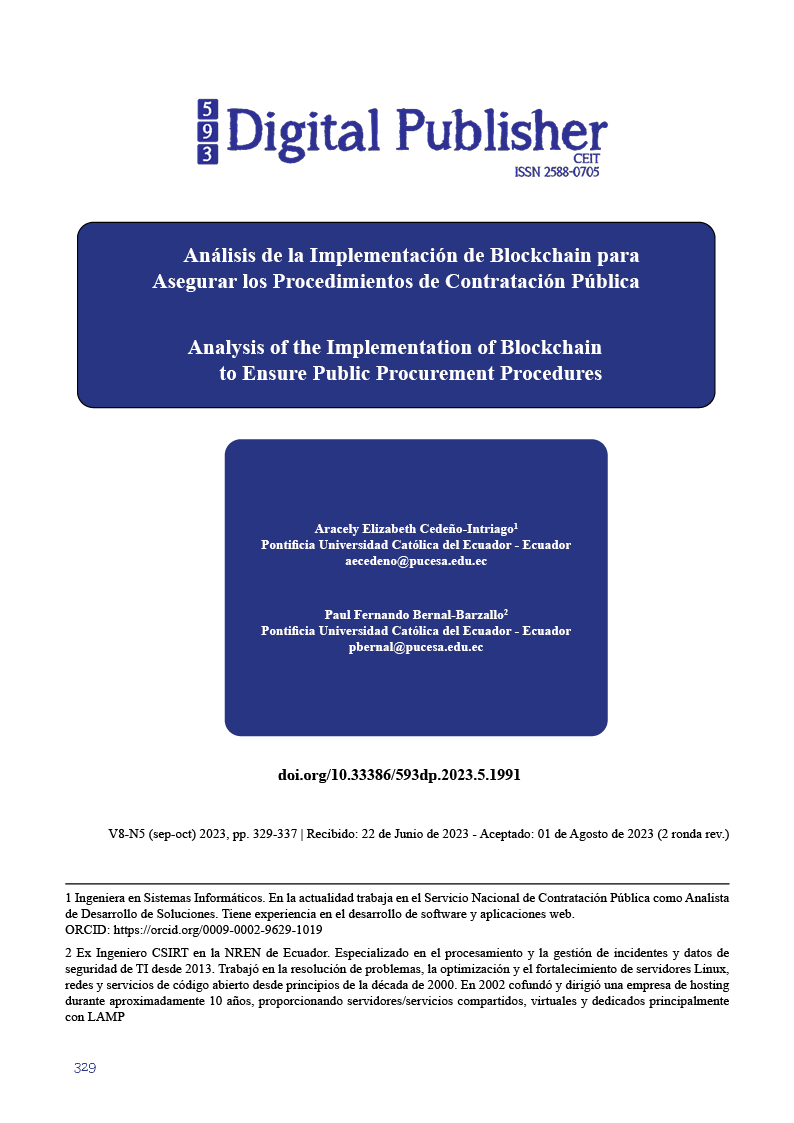Análisis de la Implementación de Blockchain para Asegurar los Procedimientos de Contratación Pública
Contenido principal del artículo
Resumen
El presente trabajo de investigación aborda los modos y procedimientos de la implementación de la tecnología Blockchain para asegurar los procedimientos de contratación pública. Debido a las características, ventajas e importancia en el ámbito jurídico, la puesta en ejecución de este mecanismo digital le hace frente al desafío de prestar servicios públicos, en cantidad y calidad, de manera eficiente y transparente, y a menudo con menos recursos disponibles. Actualmente, en el Servicio Nacional de Contratación Pública (Sercop) existen procesos de contratación que tienen mayor cantidad de recursos económicos asignados, donde se suelen encontrar ciertas irregularidades, principalmente en la etapa de adjudicación de proveedores. En este sentido, el propósito del presente artículo es analizar la implementación de Blockchain para asegurar los procedimientos de contratación pública. De este modo, el enfoque de investigación es cuantitativo; para ello se realizaron encuestas al personal que labora en la Dirección de Tecnología del Servicio Nacional de Contratación Pública (Sercop). Con la aplicación de este instrumento se pretende conocer el porcentaje de la problemática actual de los procesos de contratación en el Ecuador; asimismo, se procede a la revisión de literatura relacionada con el funcionamiento de la tecnología Blockchain y su aplicación en los procedimientos de contratación. Con ello se procura obtener como resultado un análisis de la factibilidad técnica, económica y legal de la aplicación de la tecnología Blockchain en los procedimientos de contratación pública en el Ecuador.
Descargas
Detalles del artículo

Esta obra está bajo una licencia internacional Creative Commons Atribución-NoComercial-CompartirIgual 4.0.
1. Derechos de autor
Las obras que se publican en 593 Digital Publisher CEIT están sujetas a los siguientes términos:
1.1. 593 Digital Publisher CEIT, conserva los derechos patrimoniales (copyright) de las obras publicadas, favorece y permite la reutilización de las mismas bajo la licencia Licencia Creative Commons 4.0 de Reconocimiento-NoComercial-CompartirIgual 4.0, por lo cual se pueden copiar, usar, difundir, transmitir y exponer públicamente, siempre que:
1.1.a. Se cite la autoría y fuente original de su publicación (revista, editorial, URL).
1.1.b. No se usen para fines comerciales u onerosos.
1.1.c. Se mencione la existencia y especificaciones de esta licencia de uso.
Citas
Arteaga, J. (2018). Blockchain en procesos de participación ciudadana: innovando desde la práctica en el Ayuntamiento de Alcobendas. Madrid: Centro de Estudios Políticos y Constitucionales.
Barria, S. (2022). Introducción al blockchain. Revista Blockchain e Inteligencia Artificial, 3(4), 1-28. http://dx.doi.org/10.22529/rdm.2022(4)01
Benítez, L. (2020). Blockchain para la transparencia, gestión pública y colaboración. Teknokultura. Revista de Cultura Digital y Movimientos Sociales, 18(1), 23-32. http://dx.doi.org/10.5209/TEKN.71514
Benítez, L. (2021). Blockchain para la transparencia, gestión pública y colaboración. Teknokultura. Revista de Cultura Digital y Movimientos Sociales, 18(1), 23-32. https://doi.org/10.5209/tekn.71514
Brandom, R. (2019). Why the Ethereum Classic hack is a bad omen for the blockchain. The Verge, 2(2), 7-19. https://www.theverge.com/2019/1/9/18174407/ethereum-classic-hack-51-percent-attack-double-spend-crypto
Gómez, J. (2017). Blockchain y los contratos inteligentes. https://joelgomez.abogado.digital/wp-content/uploads/2019/09/Blockchain-y-Contratos-Inteligentes-AbogadoCorporativo.pdf
Grigera, S. (2021). Ciberseguridad y Blockchain. Ciencias jurídicas. Revista Blockchain e Inteligencia Artificial, 2(3), 85-94. revistas.bibdigital.uccor.edu.ar/index.php/rbia/article/view/5254/6502
Ibáñez, J. (2018). Cuestiones jurídicas en torno a la cadena de bloques («blockchain») y a los contratos inteligentes. Revista De La Facultad De Derecho, 2(101), 1-8. DOI: https://doi.org/10.14422/icade.i101.y2017.003
Oszlak, O. (2021). El Estado en la era exponencial. Buenos Aires: CEDES.
Preukschat, A. (2017). Blockchain: la revolución industrial de internet. Barcelona: Gestión 2000.
Quintana, J. (2020). La tecnología blockchain y su pretendida aplicación a la contratación pública como mecanismo para lograr mayor integridad. Revista española de control externo, 22(64), 150-171. https://dialnet.unirioja.es/servlet/articulo?codigo=7776793
Ronquillo, G. (2021). Propuesta de modelo de gestión documental académica inteligente empleando blockchain. (Tesis de maestría). Escuela Politécnica Nacional, Quito, Ecuador. https://bibdigital.epn.edu.ec/bitstream/15000/21602/1/CD%2011087.pdf
Ronquillo, G. (2021). Propuesta de modelo de gestión documental académica inteligente empleando Blockchain. (Tesis de pregrado). Escuela Politécnica Nacional, Quito, Ecuador. https://bibdigital.epn.edu.ec/bitstream/15000/21602/1/CD%2011087.pdf
Sosa, W. (2019). Big data. Buenos Aires: Siglo XXI Editores
Villacís, R. (2019). La legislación ecuatoriana en el uso de Blockchain, Revista Yura, 18(2), 80–97. https://yura.espe.edu.ec/wp-content/uploads/2019/04/18.5-La-legislaci%C3%B3n-ecuatoriana-en-el-uso-de-Blockchain.pdf
Villafuerte, D. (2020). El smart legal contract como nueva forma de contratación en el código de comercio ecuatoriano. (Tesis de pregrado). Pontificia Universidad Católica del Ecuador, Quito, Ecuador.



